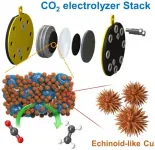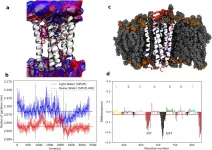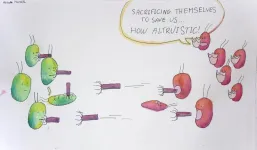How has the COVID-19 pandemic impacted peoples' interactions with nature?
2021-04-07
(Press-News.org) The COVID-19 pandemic and the global response to it have changed many of the interactions that humans have with nature, in both positive and negative ways. A perspective article published in People and Nature considers these changes, discusses the potential long-term consequences, and provides recommendations for further research.
The authors of the article note that the pandemic constitutes a 'global natural experiment' in human-nature interactions that, without seeking to downplay or ignore its tragic consequences, provides a rare opportunity to produce in-depth knowledge about these interactions and to help establish actions that can have positive effects for both humans and nature.
"Although undeniably tragic, the COVID-19 pandemic may offer an invaluable opportunity to explore an appropriate future relationship between people and nature," said lead author Masashi Soga, PhD, of the University of Tokyo.
INFORMATION:
[Attachments] See images for this press release:

ELSE PRESS RELEASES FROM THIS DATE:
2021-04-07
On the first day of the UK campaign for COVID-19 vaccination, there were reports of two cases of anaphylaxis--a severe, potentially life-threatening allergic reaction--within minutes of administration of the Pfizer/BioNTech mRNA vaccine. Subsequently further cases of suspected anaphylaxis to the Pfizer vaccine were reported. A new report published in Clinical & Experimental Allergy reveals that an allergy to the ingredient polyethylene glycol (PEG) is a cause of anaphylaxis to the vaccine. However, this is in the context of millions of doses safely administered.
The authors note that very few people are allergic to PEG, and they provide a guide to identifying those who are ...
2021-04-07
Studies on electrochemical CO2 conversion systems which can be used to obtain useful chemicals through conventional petrochemical processes while eliminating CO2, without polluting the environment, are essential for creating a carbon-neutral society. While significant progress has been made through a number of relevant studies, thus far, they have only been laboratory-scale in size. In fact, there are still many roadblocks to industrial application, such as the scaling up and development of suitable catalysts and electrodes.
The END ...
2021-04-07
Ordinary pure water has no distinct taste, but how about heavy water - does it taste sweet, as anecdotal evidence going back to 1930s may have indicated? And if yes - why, when D2O is chemically practically identical to H2O, of which it is a stable naturally-occurring isotope? These questions arose shortly after heavy water was isolated almost 100 years ago, but they had not been satisfactorily answered until now. Now, researchers Pavel Jungwirth and Phil Mason with students Carmelo Tempra and Victor Cruces Chamorro at the Institute of Organic Chemistry and Biochemistry of the Czech Academy of Sciences (IOCB Prague), together with the group of Masha Niv at the Hebrew University and Maik Behrens at the Technical University of Munich, found answers to these questions using molecular dynamics ...
2021-04-07
CLEVELAND--A team of researchers from Case Western Reserve University has discovered a formulation of existing medicines that can significantly reduce the presence of the fungus Candida auris (C. auris) on skin, controlling its spread and potentially keeping it from forming infections that have a high mortality rate.
By using a proprietary formulation of topical medications terbinafine or clotrimazole, researchers prevented the growth and spread of the fungus on the skin of a host; the findings appear in the most recent issue of the journal Antimicrobial Agents and Chemotherapy.
"It's a very ...
2021-04-07
Though the U.S. and South Korea recorded their first official COVID-19 case on the same day, January 20, 2020, there were notable differences in how each country would ultimately address what has become the world's most severe pandemic since 1918.
Yoonjung Lee, Pharm.D., Ph.D., a pharmacy preceptor and pharmaceutical sciences researcher at the Texas Tech University Health Sciences Center (TTUHSC) Jerry H. Hodge School of Pharmacy, said she was surprised at how South Korea effectively managed the pandemic without the business shutdowns and lockdowns that occurred in China, the U.S. and many European countries.
"I am amazed at how the Korean government had prompt and effective public health interventions to not only address COVID-19, but also to address COVID-19-vulnerable ...
2021-04-07
Imagine there are arrows that are lethal when fired on your enemies yet harmless if they fall on your friends. It's easy to see how these would be an amazing advantage in warfare, if they were real. However, something just like these arrows does indeed exist, and they are used in warfare ... just on a different scale.
These weapons are called tailocins, and the reality is almost stranger than fiction.
"Tailocins are extremely strong protein nanomachines made by bacteria," explained Vivek Mutalik, a research scientist at Lawrence Berkeley National Laboratory (Berkeley Lab) who studies tailocins and phages, the bacteria-infecting viruses that tailocins appear to be remnants of. "They ...
2021-04-07
AI-powered symptom checkers can potentially reduce the number of people going to in-person clinics during the pandemic, but first, researchers say, people need to know they exist.
COVID symptom checkers are digital self-assessment tools that use AI to help users identify their level of COVID-19 risk and assess whether they need to seek urgent care based on their reported symptoms. These tools also aim to provide reassurance to people who are experiencing symptoms that are not COVID-19 related.
Most platforms, like Babylon and Isabel, are public-facing tools, but the University of California, San Francisco (UCSF) has one of the first COVID-19 symptom checkers that is fully integrated with the users' medical ...
2021-04-07
Study using electronic health records of 236,379 COVID-19 patients mostly from the USA estimates that one in three COVID-19 survivors (34%) were diagnosed with a neurological or psychiatric condition within six months of infection.
Anxiety (17%) and mood disorders (14%) were the most common. Neurological diagnoses such as stroke and dementia were rarer, but not uncommon in those who had been seriously ill during COVID-19 infection. For example, of those who had been admitted to intensive care, 7% had a stroke and almost 2% were diagnosed with dementia.
These diagnoses were more common in COVID-19 patients than in flu or respiratory tract infection patients ...
2021-04-07
Highlight
Most patients with kidney failure who were undergoing hemodialysis developed a positive antibody response after being vaccinated for COVID-19, but their response was lower than that of individuals without kidney disease.
Washington, DC (April 6, 2021) -- In a recent study, most patients with kidney failure who were undergoing hemodialysis developed a substantial antibody response following the vaccination with the Pfizer-BioNTech vaccine against COVID-19, but it was significantly lower than that of individuals without kidney disease. The findings will appear in an upcoming ...
2021-04-06
CHAPEL HILL, NC - A team led by scientists at the UNC School of Medicine identified a molecule called microRNA-29 as a powerful controller of brain maturation in mammals. Deleting microRNA-29 in mice caused problems very similar to those seen in autism, epilepsy, and other neurodevelopmental conditions.
The results, published in Cell Reports, illuminate an important process in the normal maturation of the brain and point to the possibility that disrupting this process could contribute to multiple human brain diseases.
"We think abnormalities in microRNA-29 activity are likely to be a common theme in neurodevelopmental ...
LAST 30 PRESS RELEASES:
[Press-News.org] How has the COVID-19 pandemic impacted peoples' interactions with nature?






